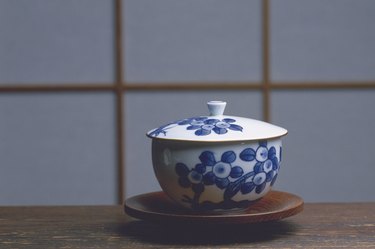
A form of Japanese tea, kukicha, or bocha, which translates to "twig tea," is made from twigs and stems of the Camellia sinesis tea tree. The higher-grade teas, such as matcha and sencha, are produced using the buds and leaves, leaving the plants nearly bare after harvesting. Kukicha usually takes the form of green tea, but more oxidized varieties are available. Twig tea has a slightly sweet and nutty flavor. The common green tea variety of kukicha has a wide variety of touted health benefits.
Vitamins and Mineral Content
Video of the Day
Because twig tea is comprised of the stems and young twigs, it is rich in both vitamins and minerals that feed the growth parts of the plant. The minerals found in kukicha include copper, selenium, manganese, calcium, zinc and fluoride. Kukicha contains vitamins A and C and the B-complex vitamins, which are all potent antioxidants. Twig tea contains more calcium than cow's milk, according to Julie Ong, author of "The Everything Guide to Macrobiotics."
Video of the Day
Cancer Prevention
All varieties of green tea have been touted for their anti-cancer potential. A review published in the 2011 issue of "Pharmacological Research" notes that antioxidant compounds in green tea have been shown effective against numerous cancer cell lines, including breast, skin, lung, oral, intestinal, colon, prostate, pancreas and liver cancers. Green tea stops the growth of cancerous tumors, initiates cancer-cell death and prevents cancerous cells from forming.
Control Blood Sugar
All forms of green tea also have potential use in the prevention and treatment of type 2 diabetes. A research article published in the 2004 "BMC Pharmacology" tested these uses of green tea in both diabetic mice and healthy humans. The researchers found that green tea increased the rate of glucose metabolism in the humans and lowered blood sugar levels in the mice.
Macrobiotic Benefits
The macrobiotic diet emphasizes the importance of eating whole and unprocessed foods as well as balancing the body's levels of acid. According to the book "The Everything Guide to Macrobiotics," kukicha has an alkalizing effect and lowers acidity. The book also claims that twig tea contains high levels of calcium, burns fat and lowers cholesterol. If your body remains in an acid state for too long of a time, you may experience organ failure, respiratory failure, shock and possibly death, according to the National Institutes of Health.
- Pharmacological Research: Cancer Prevention By Tea: Evidence From Laboratory Studies
- BMC Pharmacology: Effect of Green Tea on Blood Glucose Levels and Serum Proteomic Patterns in Diabetic Mice and on Glucose Metabolism in Healthy Humans
- The Everything Guide to Macrobiotics; Julie S. Ong, et al.
- MedlinePlus.com: Respiratory Acidosis
- Oprah.com: 6 New Superfoods You Haven't Tried Before